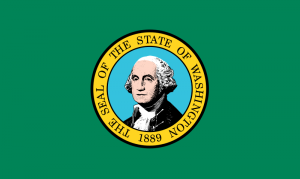Washington
Teaching Standards and Leadership Standards
Teaching Standards
Is working with and meeting the needs of students with disabilities addressed in state teaching standards?
Pre-service educators must demonstrate national knowledge and skills competencies most recently published by the Council of Chief State School Officers (CCSSO) known as the Interstate Teacher Assessment and Support Consortium Model Core Teaching Standards and Learning Progressions for Teachers InTASC. The board reserves the option to include any additions deemed necessary and has done so. In additional to InTASC Standards, educator candidates must:
- complete coursework on issues of abuse and emotional or behavioral distress in students;
- complete a one quarter or semester course, or the equivalent in continuing education credit hours, in either Washington state history and government, or Pacific Northwest history and government in the curriculum of all teacher preparation programs.
- Engage with the Since Time Immemorial curriculum
- demonstrate knowledge of the paraeducator standards of practice, as published by the paraeducator board.
- demonstrate knowledge and skill in self-assessment, goal setting, and reflective practice as related to the states Teacher and Principal Evaluation Program (TPEP)
- demonstrate knowledge and skill in Cultural Competency, Diversity, Equity and Inclusion standards.
The InTASC standards address differentiating instruction to meet individual student needs. They require teacher candidates to address diverse learning needs and adapt instruction and assessments to meet all students’ learning needs, including students with disabilities.
In-service teachers use the National Board for Professional Teaching Standards (NBPTS) standards, including the Five Core Propositions to align their professional growth plans (PGP) for certificate renewal, and by clock hour providers to align their clock hour offerings. The NBPTS standards included standards for “Exceptional Needs” although teachers are not required to engage with these standards.
Sources:
Professional Educator Standards Board (PESB), Washington Teacher Standards-Based Benchmarks
PESB, edTPA
Revised Code of Washington, 28A.410.280, Evidence-based assessment of teaching effectiveness—Teacher preparation program requirement
Email communication with the PESB, October 2, 2014
School Leadership Standards
Is knowledge of working with students with disabilities included in leader standards?
The board adopted the national knowledge and skills competencies most recently published by the National Policy Board for Educational Administration known as the National Educational Leadership Preparation (NELP) Standards – Building Level. The board reserves the option to include any additions deemed necessary and has done so. In additional to NELP Standards, educator candidates must:
- Demonstrate that they can recognize signs of emotional or behavioral distress in students and appropriately refer students for assistance and support, teacher and principal preparation program providers must incorporate the social emotional standards and benchmarks, and must provide guidance to candidates on related competencies
- demonstrate knowledge and skill in Cultural Competency, Diversity, Equity and Inclusion standards.
The NELP building level standards highlight the role of school leaders to ensure equity across the school community for diverse learners including students with a disability or special status The PESB’s current standards for a Residency Principal include the NELP building level standards under Domain 2.
In-service principals, program administrators, superintendents use National policy board for educational administration (NPBEA) Professional standards for educational leaders (PSEL) to align their professional growth plans (PGP) for certificate renewal, and by clock hour providers to align their clock hour offerings.
Source: Revised Code of Washington Title Here (RCW 28A.410.270.)
Teacher and Principal Preparation
Teacher Preparation – Program Approval/Accreditation
Required course work in teaching students with disabilities/diverse learners
PESB program design standards do not require specific coursework in teaching students with disabilities, as Washington is a competency-based state. However, preparation programs must be in compliance with the program approval standards that outline, among others, the following criteria for effective teaching:
- Using multiple instructional strategies, including the principles of second language acquisition, to address student academic language ability levels and cultural and linguistic backgrounds;
- Planning and/or adapting standards-based curricula that are personalized to the diverse needs of each student;
- Planning and/or adapting learner-centered curricula that engage students in a variety of culturally responsive-, developmentally- and age-appropriate strategies.
Sources:
Washington Administrative Code(WAC) 181-78A-270 (1)
PESB, Standard 4 (2010) – Program Design
Email communication with the PESB, October 2, 2014
Clinical time in diverse settings/teaching special populations
The PESB preparation program design standards require clinical practice (defined as supervised planning, instruction, and reflection) for teacher candidates to consist of “no less than 450 hours in classroom settings”. Standard 4.E (Diversity) requires teacher candidates to have “significant interactions with diverse populations including colleagues, faculty, P-12 practitioners, and P-12 students and families.” It calls for candidates and faculty to “articulate a broad definition of culture and diversity that includes socio-economic, gender, ethnicity, race, and exceptionalities.”
Sources:
WAC 181-78A-264
PESB, Standard 4 (2010) – Program Design
Teacher Preparation – Accountability
Quality of teacher preparation programs
Washington collects some program-specific, objective data that reflect teacher preparation program performance, including candidate “work samples” that document a positive impact on student learning and first-year teacher/principal surveys.
PESB preparation program standards (Standard 2 – Accountability and Program Improvement) require each program to maintain an assessment system that gathers evidence on candidate learning and program operations (including placement rates, clinical experiences, and candidate characteristics), collects candidate work samples, aggregate key data over time, and provides for regular analysis of assessment results. Standard 1 requires each institution’s Professional Education Advisory Board to annually review and analyze data for the purposes of determining whether candidates have a positive impact on student learning and making recommendations for program improvement. This data may include, but not be limited to: Student surveys, follow-up studies, employment placement records, student performance portfolios, course evaluations, and summaries of performance on the pedagogy assessment for teacher candidates.
Sources:
PESB, Standard 2 (2010) – Accountability and Program Improvement
PESB, Standard 1 – Professional Education Advisory Board
WAC 181-78A-209, Professional education advisory boards – Membership
National Council on Teacher Quality, 2012 State Teacher Policy Yearbook: Improving Teacher Preparation in Washington
Email communication with the PESB, October 2, 2014
Principal Preparation – Program Approval/Accreditation
Require course work in leading a school/district that serves students with disabilities/diverse learners
PESB program design standards do not require specific coursework in teaching students with disabilities, as Washington is a competency-based state. However, preparation programs must prepare principals and superintendents who have “the knowledge, skills, and cultural competence to improve learning and achievement to ensure the success of each student.”
Sources:
WAC 181-78A-270 (2)
PESB, Standard 4 (2010) – Program Design
Principal Preparation – Accountability
Are programs reviewed based on outcomes of graduates’ success? Can school principals be linked back to institutions of higher education and preparation programs?
PESB preparation program standards (Standard 2 – Accountability and Program Improvement) require each program to maintain an assessment system that gathers evidence on candidate learning and program operations (including placement rates, clinical experiences, and candidate characteristics), collects candidate work samples, aggregate key data over time, and provides for regular analysis of assessment results. Standard 1 requires each institution’s Professional Education Advisory Board to annually review and analyze data for the purposes of determining whether candidates have a positive impact on student learning and making recommendations for program improvement. This data may include, but not be limited to: Student surveys, follow-up studies, employment placement records, student performance portfolios, and course evaluations.
Sources:
PESB, Standard 2 (2010) – Accountability and Program Improvement
PESB, Standard 1 – Professional Education Advisory Board
WAC 181-78A-209, Professional education advisory boards – Membership
Teacher and Principal Certification/Licensure
Teacher Certification/Licensure – Structure
Is a specific certificate, license or endorsement related to special education required?
Washington does not distinguish between elementary and secondary special education teachers. The state offers only a K-12 special education certification, in addition to an option for early childhood special education.
Source: National Council on Teacher Quality, 2012 State Teacher Policy Yearbook: Improving Teacher Preparation in Washington
Teacher Certification – Examination
Does the state require teachers to pass a basic skills exam for initial certification? What are the pass rates on the exams? Does the state require Praxis II or more pedagogical assessment for licensure? Does it include anything about teaching diverse learners or special populations?
Attempting the Washington Educator Skills Tests-Basic (WEST-B) test is required for admission to teacher preparation programs; SAT,ACT and other equivalent national or out of state assessments approved by the Board may be substituted for WEST-B .The Washington Educator Skills Tests-Endorsements (WEST-E) or National Evaluation Series(NES) is required for designated content endorsements.
Sources:
Find the pass rates for state assessments from the Educator assessment data report.
Teacher Certification/Licensure – Requirements
Is professional development around working with special student populations required to move from initial to a professional license?
In-service teachers use the National Board for Professional Teaching Standards (NBPTS) standards, including the Five Core Propositions to move to a professional license. The NBPTS standards included standards for “Exceptional Needs” although teachers are not required to engage with these standards.”
Sources:
Professional Teaching Standards (NBPTS)
Five Core Propositions
Principal Certification/Licensure – Requirements
Is prior teaching experience required to become a principal and/or a superintendent? Is specific coursework or other evidence required around working with special student populations?
The state of Washington requires school leaders to obtain a master’s degree, have prior teaching experience, and complete a state-approved preparation program.
Principals: Candidates must earn a master’s degree from a regionally accredited college/university and complete a state-approved college/university administrator preparation program or three years successful experience in the administrative role at the P-12 level while holding a regular certificate issued by another state. Candidates must hold or have held a regular teaching certificate or ESA (school counselor, school psychologist, etc.) certificate.
Superintendents: Candidates must earn a master’s degree from a regionally accredited college/university and complete a state-approved college/university administrator preparation program in the administrative role (principal, program administrator, or superintendent) or complete three years successful experience in the administrative role at the P-12 level while holding a regular certificate issued by another state. Candidates must also hold a valid regular teaching certificate, ESA, principal, or program administrator certificate.
Sources:
Washington Office of Superintendent of Public Instruction (OSPI), Certification: Administrators
Washington Administrative Code (WAC) 181-79A-150
WAC 181-79A-211
ECS, Administrator License Requirements, Portability, Waivers and Alternative Certification
George W. Bush Institute, Operating in the Dark
Teacher and Principal Induction
Teacher Induction
Is mentoring required for all new teachers and for how many years? If so, do program guidelines/requirements specifically address teaching diverse learners?
The state does not require that all beginning teachers receive induction support. However, the state operates a beginning teacher assistance program—Beginning Educator Support Team (BEST)—but it does not serve all new teachers. The Legislature funded BEST through the 2013-15 biennium and made additional funding available in the 2014 session.
Sources:
New Teacher Center, Review of State Policies on Teacher Induction
OSPI, Beginning Educator Support Team (BEST)
Principal Induction
Is coaching/mentoring required for all new principals/administrators/ superintendents and for how many years? If so, do program guidelines/requirements specifically serving diverse learners?
The state does not require new school administrators to participate in an induction program.
Source: New Teacher Center, Review of State Policies on Teacher Induction
Teacher and Principal Professional Development Standards
Teacher Professional Development Standards
Does the state have professional development standards for teacher PD?
Our state policy analysis did not identify professional development standards for teachers.
Principal Professional Development Standards
Does the state have professional development standards for leadership PD?
Our state policy analysis did not identify professional development standards for school leaders.
 This website was produced under U.S. Department of Education, Office of Special Education Programs, Award No. H325A220002. David Guardino serves as the project officer. The views expressed herein do not necessarily represent the positions or policies of the U.S. Department of Education. No official endorsement by the U.S. Department of Education of any product, commodity, service, or enterprise mentioned in this website is intended or should be inferred.
This website was produced under U.S. Department of Education, Office of Special Education Programs, Award No. H325A220002. David Guardino serves as the project officer. The views expressed herein do not necessarily represent the positions or policies of the U.S. Department of Education. No official endorsement by the U.S. Department of Education of any product, commodity, service, or enterprise mentioned in this website is intended or should be inferred.


